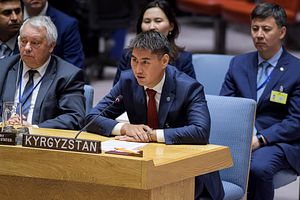On September 23, Kyrgyz Minister of Foreign Affairs Chingiz Aidarbekov gave a speech at Columbia University about regional cooperation in Central Asia.
Although the title of Aidarbekov’s speech suggested a broader take on the region, the minister began his presentation by recounting political development in Kyrgyzstan since independence. Aidarbekov lamented that “many mistakes were made by previous leaders of our country,” but pinpointed 2010 as a turning point for a “new way of development.” He spoke of the importance of the 2017 presidential elections as the country’s first peaceful transfer of power, and how smooth elections contribute to economic development.
In describing Kyrgyzstan’s political history, Aidarbekov presented a theory of development and growth that depends on top-down management of law and order. Reforms in law enforcement and the tax code create a more hospitable environment for foreign investment; a more developed economy offers resources and capacity necessary for the government to pursue further political reforms.
Aidarbekov’s speech reflected the view that regional cooperation in Central Asia is about stability, both as a precondition for integration and as a measure of successful cooperation.
It’s not enough for Kyrgyzstan alone to maintain stable domestic politics, however; regional stability is also crucial. The two main areas of contention that threaten regional harmony are border delimitation and energy, but Aidarbekov seemed optimistic about the possibility of reaching a mutual understanding on both of these interstate issues. Fighting over these issues is not worth the potential losses; Aidarbekov said that each country in the region understands that joining together yields “more profits than going alone.”
Part of this is about strength in numbers: Aidarbekov mentioned that membership in the Eurasian Economic Union puts Kyrgyzstan within a political unit boasting a collective population of 183 million, and considering Central Asia as a whole means grappling with a region of 70 million people. Compared to Kyrgyzstan’s domestic population of 6 million, these regional communities offer prospective investors a large, valuable market and real returns to scale.
But cooperation is also about matching and taking advantage of global powers’ perceptions of the region. “Big players are considering five countries as one area,” Aidarbekov said, with the implication that it is better to work together to optimize the benefits of big players’ attention to Central Asia.
Not all big players are made the same, however; Aidarbekov appeared to distinguish between the core great powers — the United States, Russia, and China — and other large economies that have sought further investment in Kyrgyzstan and Central Asia more broadly, including India and Japan.
Of the big players mentioned by name, Aidarbekov dedicated relatively more time to discuss the United States and China. When describing Kyrgyzstan’s relationship with China, Aidarbekov emphasized the importance of having good relations with a neighbor. He spoke of China’s help in building infrastructure that is necessary for further growth, but did not mention the Belt and Road Initiative by name.
Aidarbekov did not touch on the protests against Chinese investment and infrastructure projects that have been organized across Kyrgyzstan in the last year, but he did clarify that the “situation with the religious sphere” is the “internal policy of China.”
At the risk of overdetermining Aidarbekov’s intentions in referencing Xinjiang but not the Belt and Road, it is doubtful that the minister’s verbal acrobatics around certain topics and major political figures reveal anything new about Kyrgyzstan’s official policies. Of course, Kyrgyzstan must be careful in managing relationships with multiple global powers; as a representative of his country, Aidarbekov’s comments reflect that calculus.
But as an individual navigating a rift in the ruling party — Aidarbekov was appointed by Jeenbekov, but got his start in the civil service under Atambayev — his comments also hint at the uncertain topography defining Kyrgyzstan’s domestic politics.

































